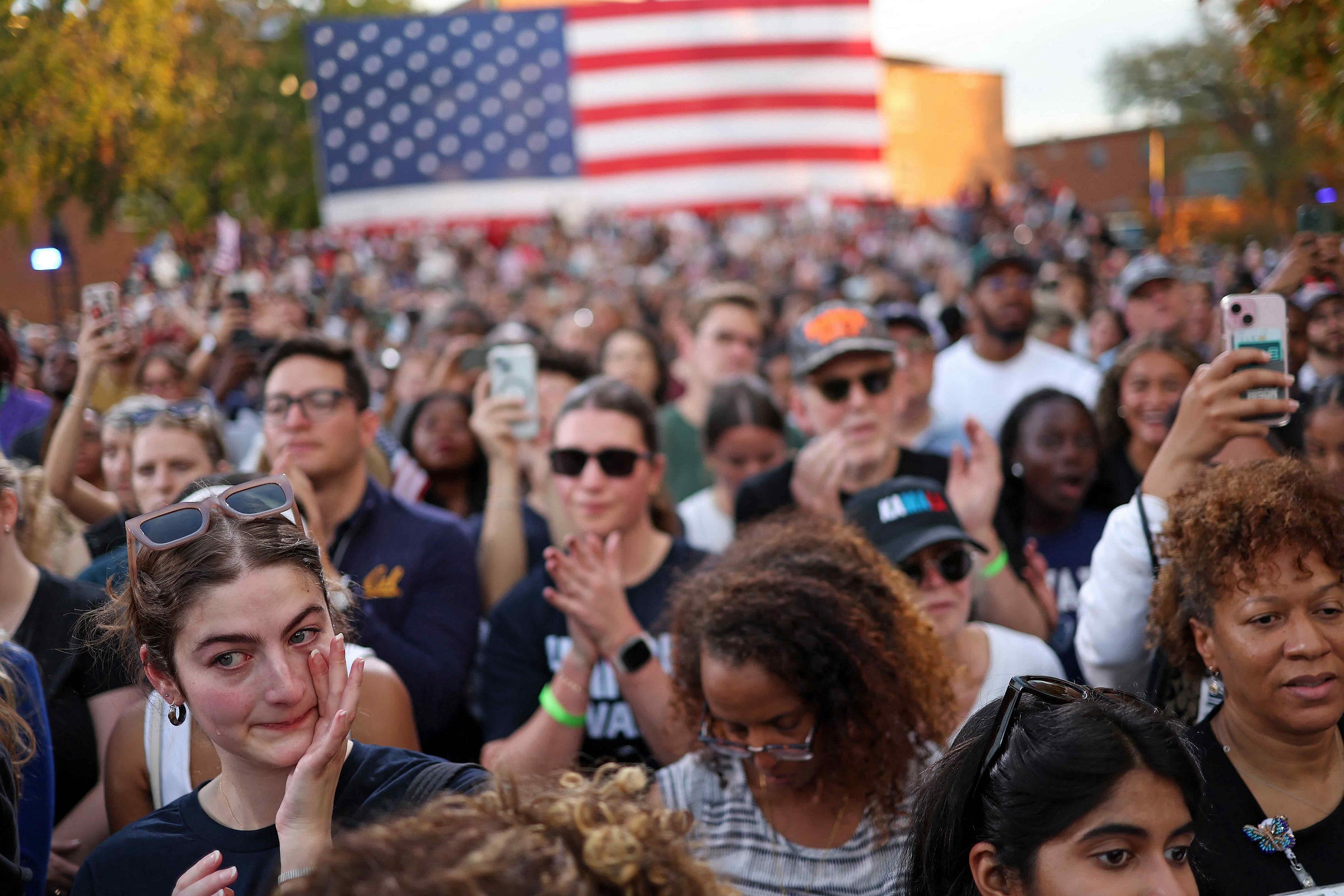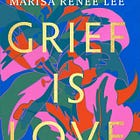Thinking Through Election Emotions with Marisa Renee Lee
How to process anger, make space for grief, and seek out joy.

In the wake of the re-election of President Donald Trump, I found myself numb. I have been, admittedly, quite cynical about American politics since I covered the 2008 presidential campaign for the Wall Street Journal. Criss-crossing the country, I experienced first-hand the wide range of views among the electorate, a preview of the deep polarization we face today.
Still, I found reasons to hope this cycle in the campaign of Vice President Kamala Harris. I watched the memes and the polls online, along with the yard signs and the postcard writing happening closer to home. On Tuesday, on my way to drop off my ballot, I saw a picture of Harris with a smile so big I shed my skepticism.
Within a few hours, that narrative changed. “Are we in trouble?” a friend texted. I had put my phone away while taking my son to baseball practice. “Spiraling,” wrote another a few minutes later. I raced home and stayed up too late with Matt watching the results trickle in, then moved through the next day in a fog. By Thursday, determined to understand what had happened, I began voraciously consuming think-pieces and hot takes (list of my recommendations below).
All the while, I wanted to better understand what I was feeling and begin to process those emotions. There was one person in particular I wanted to hear from on that front: , a political strategist and grief advocate who worked in the White House under former President Barack Obama.
Marisa and I met via social media several years ago over our shared struggles through the deaths of our mothers. I am lucky to call her a friend. Her best-selling book, Grief is Love, is a beautiful reflection on her journey through profound losses. She recently joined Substack, penning the newsletter about grief and joy as she deals with long Covid.
Below, Marisa generously shared her thoughts on the heaviness of this moment, the anger so many of us are feeling, a more complex idea of hope, and the need for service and community. My sincere thanks to her for sharing these insights.
***GIVEAWAY NOW CLOSED***
🫶 GIVEAWAY: I am giving away three annual paid subscriptions to Marisa’s Substack, Holding Both. To enter, please click above and leave a comment (an emoji will suffice, a reflection on grief or joy is also welcome). Giveaway closes Sunday, November 10 at noon PT. Winners will be chosen at random and notified via email.
The comments section of every newsletter is open to paid subscribers — thank you for your support of SMT!
Looking for more?
What I am reading, listening and watching in the wake of the U.S. presidential election (some of these are competing takes):
LISTEN: Ezra Klein of the Ezra Klein Show on Democrats greeting this moment with “contempt or curiosity”: Where Does This Leave Democrats?
WATCH: Erica L. Green of the New York Times on Harris’s concession speech:
READ:
of dives deep into the question of how to talk to white women: Let’s Talk About the White Woman ProblemREAD: Elizabeth Spiers in a guest essay for the New York Times opinion section, on what’s known as “hegemonic masculinity”: Trump Offered Men Something That Democrats Never Could
LISTEN: The Daily on how, why, and where Trump gained: Donald Trump’s America
READ: Xochitl Gonzalez, writing in the Atlantic, on what this means for women (both a reflection and a call to action): What Can Women Do Now?
LISTEN: The NPR Politics Podcast on the choices the Harris campaign made, including on reproductive rights: Harris’ Failure to Differentiate from Biden Hurt Her Odds
LISTEN: Kara Swisher and Scott Galloway of Pivot on what motivated voters and the impact of the “bro vote”: How Trump Will Impact the Economy, Tech, and Social Media
READ: Brian Stelter at CNN on this media turning point: Trump’s Return to Power Raises Serious Questions about the Media’s Credibility
Marisa Renee Lee on Grief, Anger, and Joy in This Political Moment
Please note: Our conversation has been lightly edited and condensed.
Marisa, hi, how are you feeling right now?
Marisa Renee Lee: Ugh. Brutal. I am angry. I am frustrated. I am sad. I am disappointed. I am completely fucking enraged. I am a little bit numb.
I am also feeling incredibly grateful. I feel grateful to Kamala Harris for the way she has stepped up and worked really hard on behalf of all of us these last few months and throughout her entire career. I am grateful to President Biden for his leadership and his sacrifices and for stepping aside this summer to give us the best chance possible to beat Donald Trump. I am grateful for family members and friends who are providing support, encouragement, space to commiserate and be sad together right now. I am grateful for people like you, who I consider a friend, an ally, a mentor, a supporter who is giving me an opportunity to be of service even in this moment of pain. It’s a lot of holding both. And doing what I can to carve out space for my feelings and the things I need to heal right now.
This moment feels so much heavier to me than in 2016 because President Trump’s win is so much more widespread. How does it feel to you?
It feels heavier because it should. In 2016, we were all pretty complacent and a little bit more relaxed about things, from the Obama years and from surviving other administrations that we didn’t necessarily agree with.
It feels heavier now because we know what he’s capable of. We are still feeling the aftershocks of the Trump administration all these years later. Think about what happened this spring in Alabama, with their pause on IVF procedures under their state legislature and some folks who were nominated to the court by Trump. I think about my cousin, who died in October of 2020 largely because of [Trump’s] lack of leadership around the pandemic. We know what the cost is. It is real. There are women dying in this country right now because they cannot get necessary medical treatment because of his so-called beliefs that we know are not even true. It feels heavier because it is.
How are you thinking about hope right now, and hope in this moment?
Fundamentally, I don’t think people think about hope properly. I wrote about hope in 2021 for Biden’s inauguration in Vogue, just a few weeks after January 6th (You can read that piece here: “Hope is Not the Same as Optimism”). And I said, for me, hope looks like the old Black guy janitor who reminded me of my grandfather who you saw going in to clean up the U.S. Capitol after the insurrection.
I think we think about hope in these very light and cheerful ways, when really hope has a great deal of depth and grit and pain attached to it. It is a complex thing. It is something that I think about a lot when I think about my ancestors and my family. Black people know how to do hard things with a smile on their faces and hearts filled with a genuine form of hope that acknowledges how hard things really are and then makes a decision to do something about it.
“For many of us, especially those in more vulnerable communities, our grief is accompanied by very real fear that our freedom and our safety and our ability to simply live, and live well, is threatened.”
Your book, Grief is Love, takes a long look at all the ways in which we grieve. How are we grieving now?
I think one of the challenges that people have at a time like this is actually identifying their feelings as grief. I think it is very important for people to name this heaviness, this sense of pervasive sadness, the lack of energy, the moodiness, the moment when you are short tempered and snap at your child for doing an ordinary kid thing as grief. Because as soon as we name our emotions, we reduce their power over us.
This is grief in its truest sense. In Grief is Love, I defined grief as the repeated experience of learning to live in the midst of a significant loss. I specifically did not name “people” as the loss because it’s not just about people. Whether it is the loss of health, like what I’m experiencing right now with long Covid, the loss of a marriage — a lot of people who get divorced talk about the grief that they experience when that relationship ends — the loss of expectations, a momentary, hopefully, loss of hope. Grief shows up any time a future that you reasonably planned on does not come to pass.
In this moment, we are experiencing grief. I think we all thought that when Biden stepped aside we were good. We also did the work, many of us, to ensure that we would be good. Election Day might be hard and complicated, we might not have the answers right away, etc., but we all believed she was going to win. And now here we are.
For many of us, especially those in more vulnerable communities, our grief is accompanied by very real fear that our freedom and our safety and our ability to simply live, and live well, is threatened. And that is terrifying.
Another emotion I am feeling acutely at this moment is anger. How does that fit into grief?
People often view anger as something that is keeping them from being able to grieve properly or getting in the way of their grief. But truly anger is a part of grief. It is a very normal part of the grief experience, when we lose loved ones — or anything else.
My advice to people who are angry is to name it, to own it, and to figure out what you need to do to process it so you can then move on to feeling some of the other emotions you are probably going to have associated with this loss.
One practical exercise that I have found very helpful these last few months is from Rick Rubin, who wrote the book, The Creative Act. He has an anger exercise that he believes helps to unlock creativity and also helps people process other emotions. You set a timer on your phone for five minutes and then you punch a pillow, or a couch cushion, for as long as you can as hard as you can. In my case, I have ended up in tears usually within a minute or less. Because anger is typically the first thing that we feel before we get at the deeper kind of sadness and unrest that sits beneath the surface.
What else can we do in the coming days and weeks?
First of all, we need to give ourselves permission to grieve. It can feel silly, immature, childish, unnecessary to feel so much grief around an event that some may argue doesn’t impact you personally. It feels heavy because it is and I think that everybody just needs to put aside any feelings of judgment or shame related to their grief and give themselves permission to grieve.
Once you give yourself permission to grieve, you then create space to process the loss. Identify what are the things that are going to personally help you move through this loss. Is it a difficult conversation that you feel like you need to have with a family member who you know voted for President Trump? Is it carving out more time for yourself and your family in the coming weeks as you continue to mourn and grieve? Is it talking to a mental health expert about your grief? I’m not here to tell you what the right thing is but all of those things that I just shared are rooted in data and research and are some of the ways that people tend to process loss.
As you process, you will then create space to do what I think is the next thing that we all must do: Be of service. Figure out how you are going to help ensure not only that this doesn’t happen again in four years but the people who many of us are most concerned about are going to be OK. That could mean serving as a volunteer for Planned Parenthood or using your legal expertise to help support immigrant families in your communities who are being threatened right now, standing up for a trans kid who goes to school with your child or texting a friend who you feel is more directly impacted by this loss than you are.
Whatever it is, find a way to be of service, to spread love and kindness and compassion and hope in this moment, and to be in community with other people who share your values. Those are the things we draw strength from and that is how we start to build the world that we envision. That world did not go away because some buffoon was elected this week. We all still have the power to build the world that we know needs to exist for us and for our children.
And then the last thing I’ll say, because this is what my life is about, this is what my mom was all about, this is what
is all about: Find your path to joy. Figure out what is going to put a smile on your face and bring you some joy in the days and weeks and months to come. Because joy is healing.So many thanks to Marisa. You can find her on Instagram at @MarisaReneeLee and subscribe to her Substack at
.PS: Click above and comment to enter to win one of three annual paid subscriptions I am giving away to Marisa’s fantastic newsletter. Giveaway closes Sunday, November 10 at noon PT. Winners will be chosen at random and notified via email. // GIVEAWAY NOW CLOSED










Thank you so much. Processing is what I have been trying to find: so much fear, numbness, rage...
Thank you for this. I really needed it today, and I’m grateful to learn about Marisa and her writing.